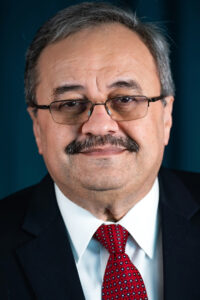
Chronic obstructive pulmonary disease (COPD) has been around a long time, but it doesn’t always get a lot of attention—despite being the third leading cause of death worldwide.
A plenary session on Wednesday—Inhaled Medications in COPD: Contemporary Strategies to Manage an Old Disease—features presentations by an interprofessional group of experts who will review current evidence for the assessment, diagnosis, and treatment of patients with COPD. The session begins at 2:15 pm CT.
“We will show that managing COPD is possible in the year 2021—we can’t cure it, but there are strategies we can implement, including using what we have learned about its multiple phenotypes, to help us personalize treatment,” said session chair Nicola A. Hanania, MD, MS, FCCP, Associate Professor of Pulmonary Medicine and Director of the Airways Clinical Research Center at Baylor College of Medicine. “Because one hand doesn’t clap, we need a team effort to manage COPD. That’s why we believe this session will highlight the roles not only of physicians, but also of respiratory care practitioners, as well as other allied personnel such as nurse practitioners, physician assistants, and pharmacists.”
Awareness of the disorder across all specialties, particularly primary care, needs to be raised, as studies show that 50% of people living with COPD have not received a diagnosis, Dr. Hanania said.
Although COPD is often considered a one-size-fits-all disease, when it comes to treatment, there is a number of phenotypes that can guide therapy, Dr. Hanania said.
In addition to the classifications known as the “pink puffer” and the “blue bloater,” which are associated with emphysema and chronic bronchitis, respectively, imaging and blood biomarkers can now be used to further divide patients into subgroups. Whether COPD is driven primarily by inflammation or by lung destruction can also shed light on how patients will fare on specific treatments, he said. Moreover, he added, inflammation may be either neutrophilic or eosinophilic, with patients in each of those groups responding differently to therapy.
A holistic approach to treatment needs to be further emphasized, as the comorbidities associated with COPD can include anxiety, depression, osteoporosis, and cardiac problems.
“As pulmonologists, we’re trained to focus on the lungs and treat patients with COPD for their respiratory symptoms, but identifying and managing other comorbidities are very important,” Dr. Hanania said.
Medical treatment is also becoming more diverse, he said, with the most recent strategies recommended by the Global Initiative for Chronic Obstructive Lung Disease including the combination of long-acting bronchodilators (LABA) with long-acting muscarinic antagonists (LAMA) in certain symptomatic patients; updates on patients who should be considered eligible for inhaled corticosteroids; and information about recently approved triple therapies that combine a LABA, a LAMA, and an inhaled steroid—a treatment that has recently been shown to reduce exacerbations and mortality in high-risk patients.
The multidisciplinary team should also be aware of the vast array of available inhaled delivery systems, he said, as personalized medicine in COPD starts with the choice of the right device for the right patient.
Challenges for practitioners include improving compliance and correct use of inhaled medications, which are notably poor in this population of patients, in addition to sorting out polypharmacy issues, which are common due to comorbidities.
“While we have only limited avenues for reducing mortality, we can improve symptoms, decrease exacerbations, and boost quality of life—and how we achieve this is where the discussion with other professionals comes in,” Dr. Hanania said. “Medications are important, but other nonpharmacologic approaches are just as important.”
This session is supported in part by an independent medical educational grant from Mylan Specialty L.P.
This session is supported in part by an independent educational grant from AstraZeneca Pharmaceuticals.
NOW IN SESSION
CHEST 2021 • OCTOBER 17-20 • INFORM. INSPIRE. INNOVATE.
Immerse yourself in the experience of CHEST 2021! Your registration includes hundreds of sessions presented by our top faculty and featured speakers, live discussions with the experts, interactive gaming, and much more. Even better, you’ll have access to everything (including post-meeting bonus content) until October 2022!
Haven’t registered yet? It’s not too late. Register now for full access.





